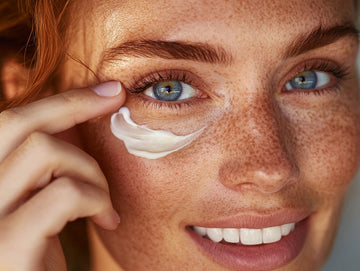Frequently Asked Questions
1. What role do hormones play in skin health?
2. How do hormonal fluctuations affect skin conditions?
3. What is the impact of the menstrual cycle on skin health?
4. How can menopause affect my skin?
5. What strategies can help maintain hormonal balance for healthier skin?
Our skin, the body's largest organ, reflects our internal health and often showcases the effects of our lifestyle choices and biological processes. One of the most significant influences on skin health, yet often overlooked, is our hormones. In this blog post, we will explore the intricate connection between hormones and skin, how hormonal fluctuations affect our skin conditions, and how understanding this relationship can aid in choosing the right skincare, including a moisturizer for dry skin and other elements like beef tallow for face skincare routine.
The Role of Hormones in Skin Health
Hormones are chemical messengers that play vital roles in regulating various bodily functions, including growth, metabolism, and mood. When it comes to the skin, they can significantly influence its appearance, texture, and overall health. Understanding the connection between hormones and skin can help individuals tailor their skincare routines based on specific hormonal changes.
How Hormones Affect Skin
Hormonal fluctuations can lead to a variety of skin issues depending on the stage of life an individual is experiencing. Here are some common ways hormones affect skin health:
- Acne: Androgens, a group of hormones that include testosterone, can increase oil production in the skin, leading to clogged pores and acne. This often occurs during puberty, menstruation, pregnancy, and in some cases, due to hormonal imbalances.
- Dryness: Estrogen plays a crucial role in maintaining skin hydration. A drop in estrogen levels, particularly during menopause, can lead to dryness and thinning of the skin, making it essential to find a suitable moisturizer for dry skin.
- Hyperpigmentation: Hormonal changes can also trigger melasma, a skin condition characterized by dark, discolored patches, often seen in pregnant women due to increased levels of estrogen and progesterone.
- Wrinkles and Fine Lines: As we age, levels of growth hormone and estrogen decrease, leading to less collagen production. This can result in sagging skin and the formation of wrinkles.
The Hormonal Cycle and Its Skin Impacts
Throughout the menstrual cycle, women experience a series of hormonal fluctuations that can significantly affect their skin. Understanding these phases can help in anticipating skin changes and addressing them effectively.
Follicular Phase
During the follicular phase, estrogen levels rise, leading to improved skin texture and tone. Many women experience a clearer complexion during this time, making it a great opportunity to focus on minimal makeup and let their skin breathe.
Ovulation
As ovulation approaches, there is a surge in luteinizing hormone and additional estrogen. This can lead to increased oil production. While some women may notice a healthy glow, others might experience breakouts, especially if they are prone to acne.
Luteal Phase
In the luteal phase, progesterone levels increase, which can lead to water retention and skin inflammation. Women may notice more puffiness and sensitivity, indicating it's time for moisturizing and incorporating soothing ingredients such as beef tallow for face products that can help manage inflammation effectively.
Menstrual Phase
During menstruation, both estrogen and progesterone levels drop, which can lead to increased oiliness for some and dryness for others. Both skin types require attention, as managing hydration remains crucial regardless of oil production levels.
Menopause and Its Skin Effects
Menopause marks a significant shift in hormone levels that can result in various skin changes. The decrease in estrogen leads to increased dryness, reduced elasticity, and the potential for more pronounced wrinkles. It becomes increasingly important during this time to find hydrating products, like an effective moisturizer for dry skin, to combat these changes.
Balancing Hormones for Healthier Skin
Understanding your hormonal health can unlock the keys to improving your skin condition. Here are some effective strategies to help maintain hormonal balance:
- Nutrition: Eating a balanced diet rich in whole foods, healthy fats, and antioxidants fuels your body and helps to stabilize hormonal fluctuations.
- Exercise: Regular physical activity can help manage weight, improve mood, and reduce stress, all of which play a role in hormonal balance.
- Stress Management: Techniques like meditation, yoga, and mindful breathing can lower cortisol levels, which, if elevated, can wreak havoc on hormones and skin health.
- Hydration: Staying hydrated is essential for maintaining skin elasticity and flushing out toxins that may impact skin quality.
- Quality Sleep: Prioritizing sleep can facilitate hormonal regulation and recovery, allowing the body—and the skin—to rejuvenate.
Assessing Your Skincare Routine
With the knowledge of how hormones affect skin, it's time to consider how your skincare routine may need adjustments based on hormonal changes. Here are some suggestions:
Moisturizers
Choosing an appropriate moisturizer for dry skin is crucial, particularly for those experiencing hormonal fluctuations that lead to increased dryness. Look for products that contain hyaluronic acid, glycerin, or natural oils that match your skin type.
Cleansers
During times of hormonal imbalance, opt for gentle, non-comedogenic cleansers that won’t strip your skin of its natural oils. Avoid harsh exfoliants that may exacerbate irritation or acne.
Active Ingredients
Incorporate ingredients like retinoids, salicylic acid, or AHAs that target acne and skin texture issues. However, be sure to consult with a dermatologist before adding potent ingredients to your regimen, especially if you have sensitive skin or are pregnant.
Soothing Treatments
For inflammation or puffiness related to hormonal changes, incorporating treatments with natural remedies like beef tallow for face can both nourish the skin and provide an anti-inflammatory effect, assisting in restoring harmony in your complexion.
Consulting with Professionals
When in doubt about the impacts of hormones on your skin or which products to use, consulting with a skincare professional or endocrinologist can provide tailored advice specific to your skin needs. They can help identify hormonal imbalances and recommend effective treatment plans.
Embracing Change: Nurturing Your Skin Journey
Understanding the connection between hormones and skin health is fundamental in shaping your skincare routines. By recognizing the various hormonal states throughout life and their effects on your skin, you can make informed decisions on the products you use and the lifestyle changes you adopt. Remember, it is crucial to be patient and allow your skin to adjust, giving time for effective treatments to show results. With the right knowledge and resources, you can embrace your unique skin journey and achieve a radiant complexion that reflects your vibrant inner health.



